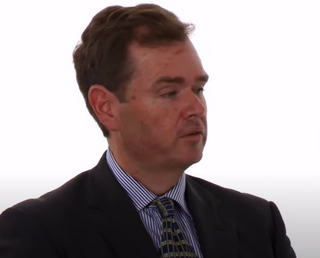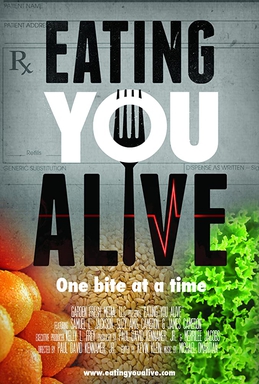
A toxin is a naturally occurring organic poison produced by metabolic activities of living cells or organisms. They occur especially as proteins, often conjugated. The term was first used by organic chemist Ludwig Brieger (1849–1919) and is derived from the word "toxic".

A poison is any chemical substance that is harmful or lethal to living organisms. The term is used in a wide range of scientific fields and industries, where it is often specifically defined. It may also be applied colloquially or figuratively, with a broad sense.

Fast Food Nation: The Dark Side of the All-American Meal is a 2001 book by Eric Schlosser. First serialized by Rolling Stone in 1999, the book has drawn comparisons to Upton Sinclair's 1906 muckraking novel The Jungle. The book was adapted into a 2006 film of the same name, directed by Richard Linklater.

Fast food is a type of mass-produced food designed for commercial resale, with a strong priority placed on speed of service. It is a commercial term, limited to food sold in a restaurant or store with frozen, preheated or precooked ingredients and served in packaging for take-out/takeaway. Fast food was created as a commercial strategy to accommodate large numbers of busy commuters, travelers and wage workers. In 2018, the fast food industry was worth an estimated $570 billion globally.

Raw foodism, also known as rawism or a raw food diet, is the dietary practice of eating only or mostly food that is uncooked and unprocessed. Depending on the philosophy, or type of lifestyle and results desired, raw food diets may include a selection of fruits, vegetables, nuts, seeds, eggs, fish, meat, and dairy products. The diet may also include simply processed foods, such as various types of sprouted seeds, cheese, and fermented foods such as yogurts, kefir, kombucha, or sauerkraut, but generally not foods that have been pasteurized, homogenized, or produced with the use of synthetic pesticides, fertilizers, solvents, and food additives.

Eric Matthew Schlosser is an American journalist and author known for his investigative journalism, such as in his books Fast Food Nation (2001), Reefer Madness (2003), and Command and Control: Nuclear Weapons, the Damascus Accident, and the Illusion of Safety (2013).

Michael Kevin Pollan is an American author and journalist, who is currently Professor of the Practice of Non-Fiction and the first Lewis K. Chan Arts Lecturer at Harvard University. Concurrently, he is the Knight Professor of Science and Environmental Journalism and the director of the Knight Program in Science and Environmental Journalism at the UC Berkeley Graduate School of Journalism where in 2020 he cofounded the UC Berkeley Center for the Science of Psychedelics, in which he leads the public-education program. Pollan is best known for his books that explore the socio-cultural impacts of food, such as The Botany of Desire and The Omnivore's Dilemma.

Fast Food Nation is a 2006 black satire film directed by Richard Linklater and written by Linklater and Eric Schlosser. The film, an international co-production of the United States and the United Kingdom, is loosely based on Schlosser's bestselling 2001 non-fiction book Fast Food Nation.
Chemophobia is an aversion to or prejudice against chemicals or chemistry. The phenomenon has been ascribed both to a reasonable concern over the potential adverse effects of synthetic chemicals, and to an irrational fear of these substances because of misconceptions about their potential for harm, particularly the possibility of certain exposures to some synthetic chemicals elevating an individual's risk of cancer. Consumer products with labels such as "natural" and "chemical-free" appeal to chemophobic sentiments by offering consumers what appears to be a safer alternative.

The health of domestic cats is a well studied area in veterinary medicine.

Food, Inc. is a 2008 American documentary film directed by Robert Kenner and narrated by Michael Pollan and Eric Schlosser. It examines corporate farming in the United States, concluding that agribusiness produces food that is unhealthy in a way that is environmentally harmful and abusive of both animals and employees. The film received positive reviews and was nominated for several awards, including the Academy Award for Best Documentary Feature and the Independent Spirit Award for Best Documentary Feature. A sequel is in the works and is scheduled to be released in late 2023.
Robert Kenner is an American film and television director, producer, and writer. Kenner is best known for directing the film Food, Inc. as well as the films, Command and Control, Merchants of Doubt, and When Strangers Click.

Michael Mosley is a British television journalist, producer and presenter who has worked for the BBC since 1985. He is probably best known as a presenter of television programmes on biology and medicine and his regular appearances on The One Show. Mosley is an intermittent fasting and low-carbohydrate diet advocate who has written books promoting the ketogenic diet. He is not a dietician.

Morris Krok was a South African author, publisher and health educator.

Eating Animals is the third book by the American novelist Jonathan Safran Foer, published in 2009. A New York Times best-seller, Eating Animals provides a dense discussion of what it means to eat animals in an industrialized world. It was written in close collaboration with Farm Forward, a US nonprofit organization promoting veganism and sustainable agriculture.

Criticism of fast food includes claims of negative health effects, animal cruelty, cases of worker exploitation, children-targeted marketing and claims of cultural degradation via shifts in people's eating patterns away from traditional foods. Fast food chains have come under fire from consumer groups, such as the Center for Science in the Public Interest, a longtime fast food critic over issues such as caloric content, trans fats and portion sizes. Social scientists have highlighted how the prominence of fast food narratives in popular urban legends suggests that modern consumers have an ambivalent relationship with fast food, particularly in relation to children.
Ch'ang Ming is a series of dietary and health recommendations based on Taoist philosophy. It was first introduced to the West by Chan Kam Lee, a Taoist teacher and Chinese herbal medicine practitioner who came to London in 1930 from Shandong Province in China. He took the Taoist principles of Traditional Chinese Medicine and adapted them to Western foods and eating habits.

David Gillespie is an Australian lawyer, anti-sugar activist and low-carbohydrate diet author who has written several books about health and nutrition. Gillespie admits to no qualifications in nutrition or medicine. Gillespie's advocacy for a diet high in saturated fat and his erroneous claim that polyunsaturated fat from vegetable oil is toxic have been criticized by medical experts as dangerous, misleading and wrong.

Eating You Alive is a 2018 vegan health documentary film about why Americans are suffering from chronic diseases such as cardiovascular disease, diabetes, obesity, autoimmune disease, among other diseases, and whether the outcome can be changed.
















